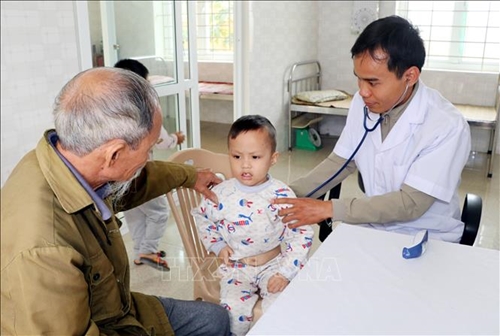The joint statement was issued on the occasion of the World Immunisation Week that lasts from April 24-30.
According to the joint statement, with the COVID-19 pandemic dominating attention in Vietnam and across the world, WHO and UNICEF are calling on national and local health authorities, families and communities, as well as development partners and the private sector to step up efforts to ensure that children continue to receive essential immunization during the pandemic, so that ground is not lost in the fight against vaccine-preventable diseases.
    |
 |
|
UNICEF, WHO ready to further support Vietnam in immunisation for children (Photo for illustration) |
If vaccination continues to be disrupted, those diseases could return, and the world could see vaccine preventable disease outbreaks.
The COVID-19 pandemic is overstretching health care systems and has already disrupted immunisation services in many places because health workers have been reassigned to the pandemic response and in many instances, they have also been discouraged to conduct routine activities involving physical interactions with healthy people.
Some parents are consciously avoiding health care facilities, worried that the COVID-19 virus could be transmitted to them and their babies.
At this critical time, children are missing important milestones in their immunisation schedule, and this situation could put their health at risk.
Data from around the world indicate that more than 117 million children are at risk of missing out on measles vaccines globally due to the pandemic, and Vietnam is not an exception.
“We have observed in the country a decrease in vaccine coverage and the occurrence of measles and pertussis cases in the first quarter of 2020,” they explained.
The science proved that vaccines work. They are a safe, effective and life-saving tool against certain diseases that can be deadly for children. Immunisation can also protect adolescents, adults, older people, and they keep whole communities safe.
Vietnam strives to improve immunisation services across the country. The Ministry of Health works on the basis of scientific evidence to build confidence, trust and demand for vaccination among communities and to counter misinformation spread online.
WHO and UNICEF are committed to continuing to provide fact-based information on vaccines to health authorities, to the public in general and to parents in particular with so that everyone can make informed decisions.
While Vietnam is on a path to success in containing the spread of COVID-19 now, the fight against that disease may continue for years to come. It should be everyone’s priority to start planning on how we can continue to provide essential health services – including immunization – at any stage of the pandemic.
“We are encouraging health services to reach out, and parents to prioritise securing vaccination to protect their children. It is time to setup a plan for routine immunisation to return to normal while ensuring social distancing and the safety of health workers and communities. It is also time to work jointly to ensure that those children who missed essential vaccines in the last months are brought up to date with their immunisation. As we have learnt in other crisis, when health workers reach families to immunise children it is also a prime opportunity to attend to other key health interventions. UNICEF and WHO stand ready to continue our support to the Government of Vietnam in this effort,” the statement said.
The COVID-19 pandemic has revealed what is at stake when communities do not have the protective shield of immunisation against an infectious disease.
“We need to build on past and current experiences to better prepare for future disease outbreaks, and we must act now to develop appropriate strategies with political and financial commitment to protect existing and future immunisation services. Let’s join hands to save lives with immunisations readily available to everyone,” it concluded.
Source: VNA